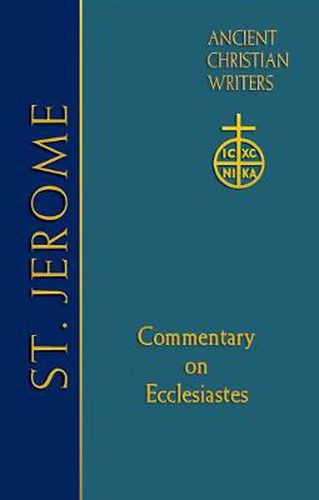Readings Newsletter
Become a Readings Member to make your shopping experience even easier.
Sign in or sign up for free!
You’re not far away from qualifying for FREE standard shipping within Australia
You’ve qualified for FREE standard shipping within Australia
The cart is loading…






Jerome’s scholarly achievement was remarkable, and this early work of his is both a fine tribute to his learning and a not always creditable revelation of his character. He learned Hebrew from a Jewish biblical scholar, to the point where he could make valuable three-way comparisons between the Old Latin text with which he and his readers were familiar, the Greek Septuagint, and the Hebrew. He had also read widely in the works of Greek exegetes, of which he made critical use in this commentary, often comparing different interpretations and providing his own. His own pride in his education shows itself in several quotations from classical authors. This translation aims to render the biblical text, with which he prefaces each section of his commentary, in English as literal as his Latin-perhaps that of an Old Latin version. The translation of Jerome’s commentary aims at reproducing his own fluent, sometimes rather rhetorical, style; but it has often been necessary, for a modern readership, to break up his typically long sentences. The commentary shows full awareness of modern work on Ecclesiastes and provides details of Jerome’s numerous sources. An appendix puts the Latin text onto a sounder footing than any yet published, with use of the unique fifth-century manuscript in the Wurzburg University ibrary. All Hebrew, Greek, and Latin words referred to in the commentary are translated, and the Hebrew and Greek ones are also transliterated.
$9.00 standard shipping within Australia
FREE standard shipping within Australia for orders over $100.00
Express & International shipping calculated at checkout
Jerome’s scholarly achievement was remarkable, and this early work of his is both a fine tribute to his learning and a not always creditable revelation of his character. He learned Hebrew from a Jewish biblical scholar, to the point where he could make valuable three-way comparisons between the Old Latin text with which he and his readers were familiar, the Greek Septuagint, and the Hebrew. He had also read widely in the works of Greek exegetes, of which he made critical use in this commentary, often comparing different interpretations and providing his own. His own pride in his education shows itself in several quotations from classical authors. This translation aims to render the biblical text, with which he prefaces each section of his commentary, in English as literal as his Latin-perhaps that of an Old Latin version. The translation of Jerome’s commentary aims at reproducing his own fluent, sometimes rather rhetorical, style; but it has often been necessary, for a modern readership, to break up his typically long sentences. The commentary shows full awareness of modern work on Ecclesiastes and provides details of Jerome’s numerous sources. An appendix puts the Latin text onto a sounder footing than any yet published, with use of the unique fifth-century manuscript in the Wurzburg University ibrary. All Hebrew, Greek, and Latin words referred to in the commentary are translated, and the Hebrew and Greek ones are also transliterated.